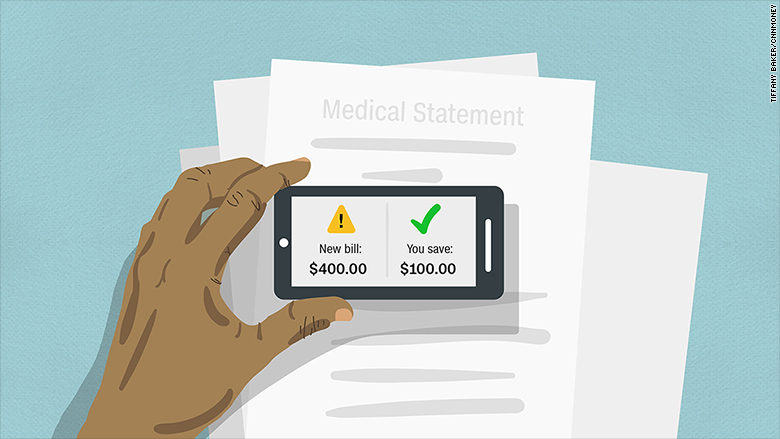
A bill for a pregnancy test when the patient's a man. Or a bill for a penile implant when the patient is a woman.
These are just two of the ironic billing mistakes that a startup called Remedy said it's discovered.
"Even absurdly obvious errors can go undetected by customers," CEO Victor Echevarria told CNNMoney.
Mistakes like these were virtually invisible to the customers who didn't see an itemized billing receipt.
Remedy, which opens up to the public on Thursday, wants to put money back into the pockets of patients who've been incorrectly billed by doctors.

Anyone can sign up for the service for free on Remedy's website. Customers select their insurance provider (or indicate if they don't have one) and authorize the startup to access their accounts. From there, Remedy will screen your medical, dental and vision bills. Echevarria said people can opt out of sharing bills from certain doctors if they'd like.
Remedy, which requests itemized bills on behalf of patients, detects mistakes using a mix of automation technology and human medical experts. It works with doctors directly to fix any errors. It can take anywhere from 12 hours to 2 months to resolve a billing case, said Echevarria.
Related: How to shave hundreds off your credit card bill
If customers get money back, Remedy will take a 20% cut of what it recovers (with a limit of $99 on any particular bill).
The company estimates that patients spend a combined $120 billion as a result of billing errors every year.
These errors aren't lightening the load for many Americans, who are struggling to pay their doctors' bills. According to a recent study, 20% of working, insured Americans have had problems paying their medical bills in the past year. That climbs to 53% with those who are uninsured.
Related: Frat brothers get free text therapy
"A key learning we've had [so far] is that there are errors everywhere," Echevarria said, noting that they've helped "hundreds" of customers get money back so far. "It's not just in $15,000 hospital bills, it is in $20 copays and $50 lab bills. Every bill matters. That's real money for some people in this country."
Echevarria said he even tasked Remedy with his own astronomical bills after his then 8-month old son ran a 104 fever and had to be rushed to the hospital.
"The medical bills started rolling in. I was three weeks into doing Remedy. $12,000 went completely to zero," he said, noting errors they were able to detect like a doctor misspelling his name on a claim form and an incorrectly assigned medical code. "It was everything from the mundane to the super complicated."
While the service isn't a covered entity under HIPAA, the company said it treats data as if it was. Still, there's always a risk with sharing confidential information online, as was seen when hackers stole the medical data of dozens of Olympic athletes.
The company has some big name backers betting on it, including Salesforce's Marc Benioff, Honest Company's Brian Lee, Haystack's Semil Shah and Precursor's Charles Hudson, who have poured $1.9 million into the company to date.

